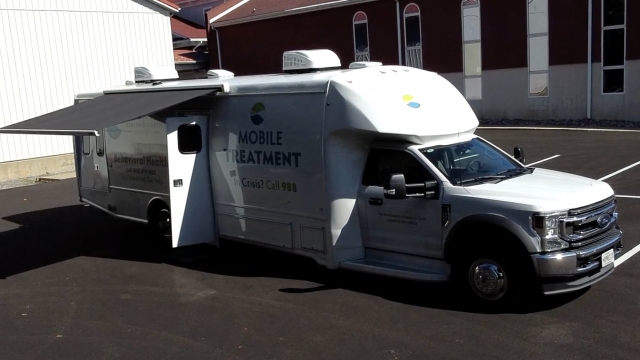The small town of Greensboro seemingly rises up out of the farm fields of Caroline County, Maryland. In the back parking lot of a local church, hope rises too, inside a mobile health unit.
"I never touched a drug until I was 36 years old," said Jessica Anthony, a lifelong resident of this rural county on Maryland's Eastern Shore.
She knows the struggle of addiction.
"I had everything before, marriage and a child," Anthony said. "Like, everything was in order. I worked for an insurance company. Then I went through a divorce and started drinking a lot, and then got involved with people I shouldn't have and took a wrong turn."
Anthony eventually sought help at the mobile health unit, a partnership between the University of Maryland and the Caroline County Health Department.
"They really turned my life around," Anthony said. "I owe everything to them."
Now, she's paying forward.
SEE MORE: Rural North Carolina county uses opioid settlements to fund solutions
Anthony is part of a new program using peer counselors who are specially-trained addiction survivors to help others facing addiction in rural areas, where help is often hard to find. About 200 patients a month seek help from a single mobile health unit in this one rural county.
"They want someone who's been there, who's walked in their shoes, who can make it feel okay when people are nervous or have a lot of barriers in starting care," said Jessica Magidson, director of the Center for Substance Use, Addiction, and Health Research at the University of Maryland.
She used her research experience in sub-Saharan Africa to help craft the program for use in rural Maryland, where health care options can be limited.
"A lot of these questions came about from understanding, 'How do we address workforce shortages in some of the poorest communities globally?'" Magidson said.
A study, funded in part by the National Institutes of Health, is looking at how this program is working.
Magidson said they recruit peer counselors from those who have gone through the addiction recovery program, which creates a paid job opportunity for them as well.
"We actually found this is a really important part of the model," she said. "That they need to be treated as part of the health care team. These are paid members of the team. They're often certified and really treated as equals on our teams."
SEE MORE: How a survivor is now helping battle the opioid epidemic
For more than a decade, deaths from synthetic opioids, like fentanyl, have been rising across the U.S. According to the CDC, more than 107,000 Americans died from fentanyl overdoses last year.
"Unemployment is very high over in this area. We have a lot of people that transportation is just almost nonexistent," said Roger McKnight, who is the administrator of the mobile treatment unit.
In addition to the peer counselors, the unit also boasts a registered nurse on hand as well as separate telehealth rooms, so patients can reach big city doctors.
McKnight recruited Jessica Anthony to be a peer specialist onboard.
"She was one of those that wanted a major change in her life," McKnight said. "I don't sell this program by pie charts and bar graphs, you know, and say, 'This is our success.' I have real people."
People like Jessica Anthony, who said she sees her life experience reflected back to her with every person she helps.
"I've seen things. I've been there. I've done it," Anthony said. "So now, where I am today, I can help people see that there's a light at the end of the tunnel."
Trending stories at Scrippsnews.com





